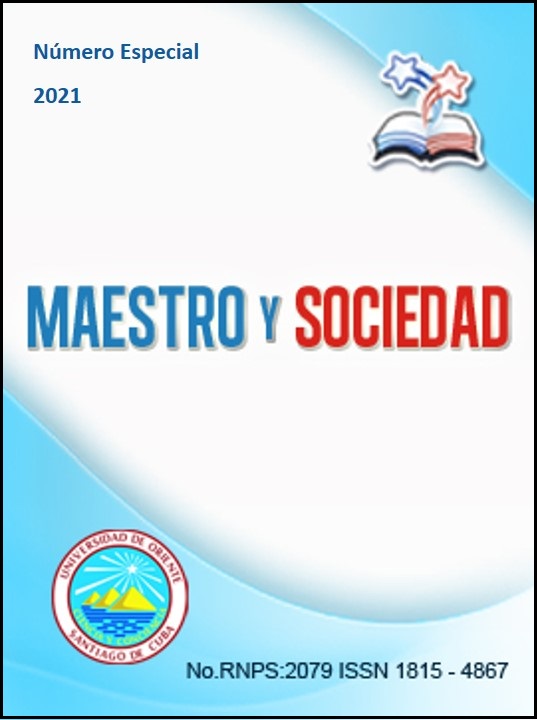Quality management in tourist destinations: a reflection from university research
Array
Keywords:
research, quality management, EcuadorAbstract
The objective of this investigation was to carry out a review study of research articles located in the Elsevier database in order to verify their contribution regarding the issue of quality management in tourist destinations to establish the trend in lines of research at the level of university centers in Ecuador. A bibliographic review was carried out in the Elsevier database, the research articles between 2012 and 2020 were considered. The qualitative and quantitative research allowed a retrospective study of publications in the Elsevier database based on descriptive and analytical methods. the exploratory to verify the level of representativeness of Ecuador at the platform level (11.5%). It is concluded by stating that in the period studied there has been a growth of 11.5% from 2019 to 2020 and from 2020 to 2021, according to the period under study, it grew by 7.2%, evaluating the level of publication as satisfactory.
References
2. Cervera-Taulet, A., Pérez-Cabañero, C., & Schlesinger, W. (2019). Experience management as an innovative approach in emerging Mediterranean destinations. Journal of Business Research, pp. 536–547. https://doi.org/10.1016/j.jbusres.2018.11.037
3. Chi, H. K., Huang, K. C., & Nguyen, H. M. (2020). Elements of destination brand equity and destination familiarity regarding travel intention. Journal of Retailing and Consumer Services, pp.52, https://doi.org/10.1016/j.jretconser.2018.12.012
4. Das Chagas, M. M., & Marques Júnior, S. (2011). Dimensiones de la calidad como antecedentes de la satisfacción y fidelidad a los destinos turísticos de sol y playa Un estudio de caso en Natal, Brasil, sobre la percepción del turista nacional. Estudios Y, 20(6), 1431–1448. http://www.scielo.org.ar/scielo.php?script=sci_arttext&pid=S1851-17322011000600011&lng=en&nrm=iso
5. Dedeoğlu, B. B. (2019). Shaping tourists’ destination quality perception and loyalty through destination country image: The importance of involvement and perceived value. Tourism Management Perspectives, pp. 105–117. https://doi.org/10.1016/j.tmp.2018.11.006
6. Dedeoğlu, B. B., Van Niekerk, M., Weinland, J., & Celuch, K. (2019). Re-conceptualizing customer-based destination brand equity. Journal of Destination Marketing and Management, pp.211–230. https://doi.org/10.1016/j.jdmm.2018.04.003
7. Hernández Palma, I., Barrios Parejo, D., Martínez Sierra H. Palma H., H. G., Parejo Ignacio, B., & Sierra David, M. (2018). Bogotá (Colombia), 16(28), 179–195.
8. Llanes, M., Isaac, C., Moreno, M., & García, G. (2014). De la gestión por procesos a la gestión integrada por procesos. Ingeniería Industrial, 35(3), 255–264. http://scielo.sld.cu/scielo.php?pid=S1815-59362014000300002&script=sci_abstract%0Ahttp://scielo.sld.cu/pdf/rii/v35n3/rii02314.pdf
9. Lugosi, P. (2019). Deviance, deviant behaviour and hospitality management: Sources, forms and drivers. Tourism Management, 74, 81–98. https://doi.org/10.1016/j.tourman.2019.02.014
10. Monsalve, C., & Hernández, S. I. (2015). Gestión de la calidad del servicio en el hotelería como elemento clave en el desarrollo de destinos turísticos sostenibles: caso Bucaramanga. EAN: Escuela de Administración de Negocios, (78), 160-173.
11. Moon, H., & Han, H. (2018). Destination attributes influencing Chinese travelers’ perceptions of experience quality and intentions for island tourism: A case of Jeju Island. Tourism Management Perspectives, pp. 71–82. https://doi.org/10.1016/j.tmp.2018.08.002
12. Moreira-Mieles, L., Morales-Intriago, J., Crespo-Gascón, S., & Guerrero-Casado, J. (2020). Caracterización de la producción científica de Ecuador en el periodo 2007-2017 en Scopus. Investig. bibl vol.34 no.82, pp.141-157.
13. Ngai, E. W. T., Xiu, L., & Chau, D. C. K. (2009). Application of data mining techniques in customer relationship management: A literature review and classification. Expert Systems with Applications, 36 (2 PART 2), 2592–2602. https://doi.org/10.1016/j.eswa.2008.02.021
14. Sörensson, A., & von Friedrichs, Y. (2013). An importance-performance analysis of sustainable tourism: A comparison between international and national tourists. Journal of Destination Marketing and Management, 2(1), pp. 14–21. https://doi.org/10.1016/j.jdmm.2012.11.002
15. Sostenibles, T., Bucaramanga, C., & Castro, C. M. (2015). Gestión de la calidad del servicio en la hotelería como elemento clave en el desarrollo de destinos turísticos sostenibles: caso Bucaramanga. Revista Escuela de Administracion de Negocios, 0(78), 160–173.
16. Ting, K., Ru-Liang, K., & Xiao-Juan, M. (2011). Research on Service Quality Engineering Management of Tourist Destination–Taking the Yangtze Three Gorges for Example. Systems Engineering Procedia, 1, pp.309–316. https://doi.org/10.1016/j.sepro.2011.08.047
17. Vajcnerová, I., Šácha, J., & Ryglová, K. (2012). Using the principal component analysis for evaluating the quality of a turist destination. Acta Universitatis Agriculturae et Silviculturae Mendelianae Brunensis, 60(2), 449–458. https://doi.org/10.11118/actaun201260020449
18. Zaharias, P., & Pappas, C. (2016). Quality Management of Learning Management Systems: A User Experience Perspective. Current Issues in Emerging ELearning, 3(1), 60–83.
Published
How to Cite
Issue
Section
License
This journal provides immediate open access to its content, based on the principle that offering the public free access to research helps a greater global exchange of knowledge. Each author is responsible for the content of each of their articles.



























 Universidad de Oriente
Universidad de Oriente 